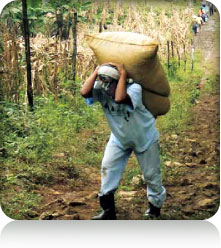
In rural agrarian economies, the targeted use of mineral fertilizer generates an immediate
return on investment.
Smallhold farmers in many areas of the world are trapped in a cycle of poverty. Generally living on one acre of land or less, they often struggle simply to feed themselves — much less generate a surplus of food. With the world's ever-growing population, helping farms become more productive is imperative.
Since 2008, The Mosaic Company and The Mosaic Company Foundation have invested in programs in Guatemala, India, Mali, Nigeria, Malawi, Kenya, Uganda, Tanzania and Ethiopia, along with our partners, HELPS International, the Sehgal Foundation and Millennium Promise. The results to date are promising: crop yields increased on average three to five times over traditional farming practices, and the farmers involved in the programs moved from not having enough food to eat to producing a surplus. In effect, fertilizer acts like an injection of capital into the local economy, and returns are realized through a food surplus. This surplus is sold at market, and revenues help farmers buy basic necessities, such as a new roof for their house or school books for their children, creating a diversified local economy.
This is a hand-up, not a hand-out. Farmers receive
no-interest loans to buy fertilizer at planting, repaid through the sale of surplus yield at harvest. Loan repayment rates run higher than 90 percent; many farmers now no longer need loans, and purchase farm inputs with accumulated savings.
Agronomic training is essential for these farmers to reach their full potential, as they suffer from depleted soils and the lack of land-management knowledge necessary to farm productively and sustainably. Our agronomists teach them modern methods: to plant seeds in tighter rows, not to burn the previous crop residue away (so as to increase organic matter in the soil), and how and when to apply the correct amount of fertilizer — education that increases yields and protects the local ecosystem.
Mosaic and our partners hope to eventually blueprint the success of these programs so that they may be recreated elsewhere. It's a physical manifestation of Mosaic's stated mission to help the world grow the food it needs.